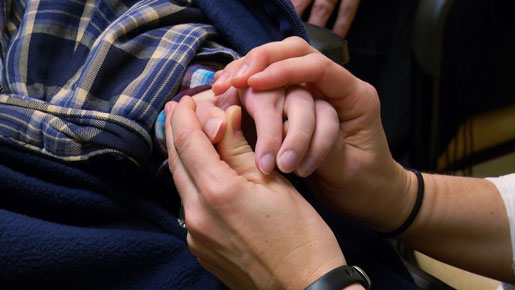Duchenne Muscular Dystrophy
Make Appointments & Get Care
What is Duchenne Muscular Dystrophy?
Duchenne muscular dystrophy is the most common type of muscular dystrophy. It causes progressive muscle weakness and eventually leads to an inability to walk.
It also can weaken the heart muscle and make the heart enlarge (dilated cardiomyopathy). The disease is caused by a genetic defect in the DMD gene. Many treatments including gene therapy are currently available.
What Are the Symptoms of Duchenne Muscular Dystrophy?
DMD affects 1 in 5,000 boys, often first causing symptoms between ages 2 and 5. It affects the hips and thighs before spreading to the arms and the rest of the body.
First signs and symptoms of DMD may include:
- Trouble with running, jumping, and climbing stairs
- Using hands to get up from sitting or squatting. This is a movement called Gower sign.
- Enlarged calves
- Waddling
- Leg pain
- Learning problems
As the disease gets worse, DMD can lead to:
- Broken bones from falling
- Greater need for a wheelchair
- Curving of the spine (scoliosis)
- Stiff joints that can’t move (contractures)
- Shortness of breath or other breathing problems
- Irregular heartbeat or other heart problems
What Causes Duchenne Muscular Dystrophy?
DMD is caused by mutations in the dystrophin gene, which helps keep muscle fibers stable. The condition generally affects boys because the dystrophin gene is on the X chromosome. The mutated gene cause your body to make very little or no dystrophin.
If the gene can still make some dystrophin, the condition has milder symptoms. This is called Becker muscular dystrophy. People with DMD generally don’t have any dystrophin at all.
UR Medicine's Treatments for Duchenne Muscular Dystrophy
The University of Rochester Medical Center is home to one of three original Muscular Dystrophy Cooperative Research Centers set up by the National Institutes of Health. Patients come from around the world for our expertise in treating many forms of MD.
Our comprehensive, multidisciplinary Neuromuscular clinic team focuses on all aspects of neuromuscular disease in adults and children, providing diagnosis and treatment using:
- Newborn screening
- Genetic confirmation
- Genetic and family counseling
- Gene therapy
- Exon skipping infusion therapy
- Physical therapy
- Prevention and management of secondary symptoms and complications, including cardiac, respiratory, behavioral, endocrine (glands and hormones), and bone health
- Access to clinical trials
- Coordination of care with schools and other providers
The UR Duchenne Muscular Dystrophy Clinic provides patients with care to improve the quality of life of children, adolescents and adults affected by the condition. We provide a team of experts in all specialties needed to best care for Duchenne muscular dystrophy. We also offer a friendly and supportive atmosphere and coordinated care that is highly accessible for families.
Patient Stories
No Longer a Death Sentence - Battling Duchenne MD
What Sets Us Apart?
Our team of experts specialize in what’s needed to care for all forms of adult and childhood muscular dystrophy. We coordinate care tailored to the needs of patients and families, in partnership with the Muscular Dystrophy Association. Our team also evaluates and treats patients with neuromuscular diseases not covered by the MDA.
UR Medicine is home to one of six NIH-funded Wellstone Muscular Dystrophy Cooperative Research Centers, and our clinicians are active in research, serving as principal investigators for national and international multi-center trials. Their work includes investigating the best treatment of patients with Duchenne Muscular Dystrophy, as well as education and advocacy involving all neuromuscular diseases.
Our Team
- Jordan Bontrager, MS, CGC
Certified Genetics Counselor - Victoria Dean, SW
Social Worker - Nicole Koopman, PT
Physical Therapist - Joan Mountain, RN
Registered Nurse - Katy Eichinger, PhD, DPT
Physical Therapist and Clinical Evaluator for Clinical Trials
Support the DMD Clinic
Your donation, no matter the size, brings us closer to life-changing discoveries and treatments. For someone living with a neuromuscular disorder, your support means more than just hope – it means a chance at a fuller, more independent life.

Providers
Locations
View All LocationsWe serve you in the Rochester metropolitan area and surrounding region.
View All Locations3 locations
Ambulatory Care Center at Strong Memorial Hospital
601 Elmwood Avenue, 1st Floor
Rochester, NY 14642
Clinton Crossings, Building C
919 Westfall Road, Suite 210
Rochester, NY 14618
